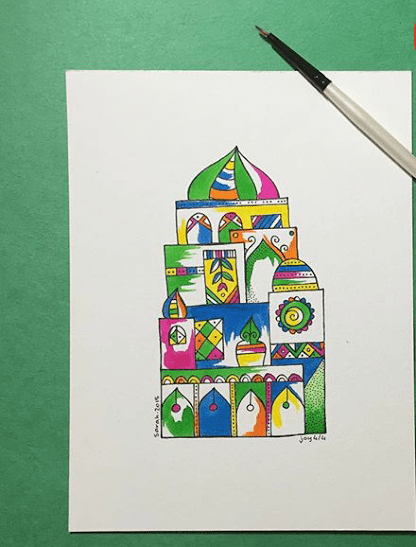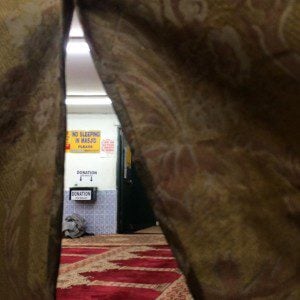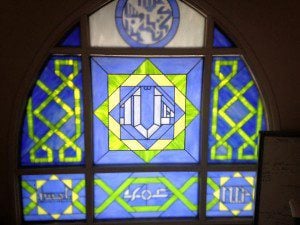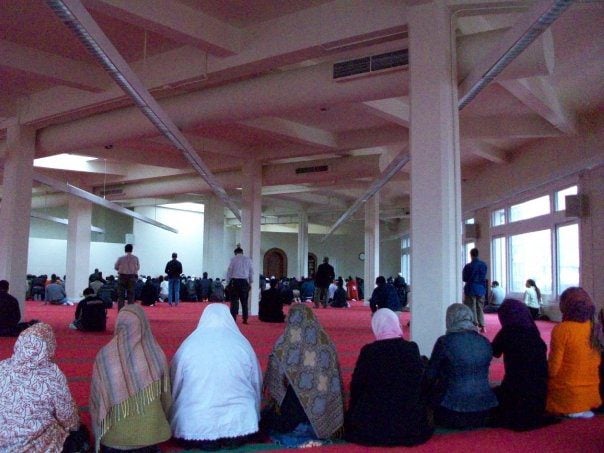
This is Day 4 of Hindtrospectives’ #MyMosqueMyStory series for Ramadan 2015
By Samar Kaukab
The lights are dimmed on the chandelier. The air is hushed and quiet. Though my hometown mosque is crowded, there is an airiness that surrounds. Be quiet enough and you can almost hear an otherworldly presence joining in worship and praise of the Divine.
Women and a few adolescent children line up in neat rows, their clothing brightly colored, loose, their scarves and chadors large, voluminous, and comforting. As a young child, I remember hiding underneath my mother’s large, cotton dupatta with embroidery on the ends that I would trace with my fingers. Seeing the Aunties in their summer cotton, water bottles filled, with their prayer rugs laid out to mark their space is a soothing sight – a spiritual hug of sorts, one part nostalgia and two parts a feeling of belonging.
This is the Islamic Center of Greater Cincinnati – the mosque I grew up in, a mosque with a female board President and a diverse congregation. For a suggested donation of a few dollars, the mosque offers a children’s program during the month of Ramadan for the first 8 rakat of taraweeh prayer that includes story time, crafts, art, and plenty of time for children to run around, make noise, and enjoin in the joys of Ramadan while their mothers and fathers pray in peace and quiet, guilt-free.
From the women’s section, I glance through the glass balcony wall that is artfully inscribed with the glorious names of God. I see similar lines of men below lined up for prayer on the same clean carpets that we stand on. Teenage boys, often taller than their fathers, line up in patches alongside their fathers. With another glance, I see and know who will be leading us in prayer this evening. Before the prayer begins, a woman speaks into a microphone and makes several announcements for everyone about community on-goings. The prayer begins.
From this balcony perch in the heights of the dome, the chandelier’s crystals twinkle and refract light in beat with the soaring sound of the Imam’s recitation of Surah Al-Baqarah – a symphony of light, sound, and air. Yes, God is everywhere, but surely tonight, God is here.
***
Fast forward a few nights, I will (God-willing) be back in my current hometown of Chicago with my own family. In this city that is now more my own than my childhood home, I will return to seeking out a place where finding God can be serene and dare I say it, even easy. From prior experience, I know this is a challenge that, for me, will be much harder than abstaining from food and drink for thirty days.
I’ve been a Chicagoan, with intermittent gaps, for about a decade now. I don’t belong to a mosque. My children don’t really belong to a mosque. In fact, they don’t even know what its like to ‘have’ a mosque, to see familiar faces, and be reminded of God.
In comparison to my experiences with the Cincinnati Muslim community in my youth and early adulthood, it’s hard not to get discouraged. As a young adult, I was used to walking into the mosque using the same entrance as my father and brother. The women’s shoe/wudu/bathroom areas were as spacious and well-shelved as those that belonged to the men.
Here, in Chicago, I’ve rarely been to a mosque where I didn’t have to enter a hidden, poorly lit side door, or, be relegated to praying in a basement that multi-tasked as a recreation room with high-pitched static coming from the speakers on even the best of days. As a working mother, I’ve had my babysitter, a local University student, be interrogated as to whether she was Muslim or not upon picking up my daughters from Qur’an class. I’ve been humiliated as I profusely apologize to her after she asked me if this was customary for Muslim houses of worship.
But as ‘unmosqued’ as my peers and I in Chicago may be, Ramadan is a time for mercy, forgiveness, and redemption. And so, we find our own spaces. We make our own entrances because we have to.
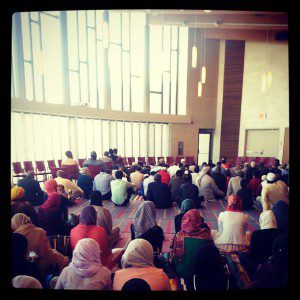
Sometimes the space is in a beautiful, light-filled theological seminary generous enough to rent space for weekly children’s religious classes while also providing a room for parents to host discussions while their children are in classes. Sometimes the space is in the home of a friend who invites groups of women to gather in the afternoon to read Qur’an together in Ramadan, children always welcome. Sometimes the space is a gathering organized by a friend who invites others to join her in designing Ramadan ‘vision boards’, even though everyone knows mostly it’s an invitation to talk things out.
Sometimes the space is in the search itself. Recently, a group of similarly displaced yet diverse Muslims living in the South Side of the city have reignited community conversations around innovative and sustainable models for community spaces that can be used for worship and meaningful programing. A regular taraweeh prayer has been organized at the University that I work at in a place where I won’t have to enter from a back door.
These are just some of the many efforts that rise and fall in this vibrant and resilient city. When I look around and see the faces of those who are stepping up to organize, I see familiar faces. I see the faces of people that I not only recognize but with whom I would leave my children with if the need arose. I see the faces of people I want to be worshiping with.
Perhaps, there is as much light to be found in the search as there is from light refracting off a crystal as it dances to the glorious melody of Qur’anic recitation. Because after all, when times are the hardest, it is people who make finding God easy. It is people who bring us back to Him.
*As the Executive Director of Arete at the University of Chicago, Samar Kaukab works to launch complex initiatives that enhance UChicago’s research enterprise. She has three children, two step-children, and is avoiding getting a pet. Follow her on Twitter.


